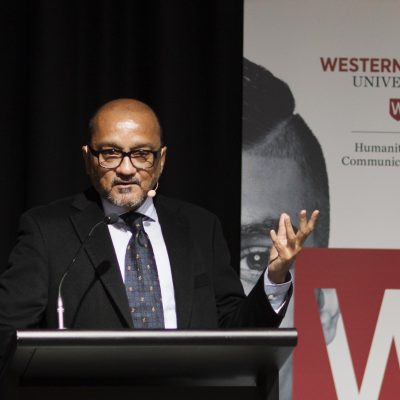Born and raised in Karachi, Pakistan, I am currently Professor of Comparative Literature at UCLA. I did my PhD work in comparative literature at Columbia with Edward Said. I have been trained in two disciplines, literary studies and anthropology, as well as South Asian, Middle-Eastern, North African, and Jewish studies, and my scholarship reflects this range of disciplinary ways of thinking.
Above all, I am a student of European colonialism, decolonization as a worldwide process, and the culture and politics of the postcolonial world. In this context, the bulk of my work has engaged with the legacies of the British Empire, especially in the Indian subcontinent, but I am also interested in French colonialism in North Africa and in its legacies for the immigration debates in France. How the figure of migrant impacts the project of European unification is one of my main preoccupations at the moment, in a book project called Strangers in Europa. Recently, I have also turned to Palestine as historical experience—the experience of the missing homeland—and its significance for the critical humanities. My writings have been a series of attempts to rethink some fundamental concepts and categories of the Western humanities—the secular, the minor, the cosmopolitan, the exilic, the border, migrant and refugee, the Anglophone, the world—from the perspective of colonized and postcolonial societies and populations. I am a long-time member of the editorial collective of the journal boundary 2 and have edited several of its special collections.
My first book, Enlightenment in the Colony: the Jewish Question and the Crisis of Postcolonial Culture (Princeton, 2007), argued that the so-called Jewish Question of the long nineteenth century in Western Europe established the paradigm for minority experience in modernity, a paradigm disseminated to the colonial world through the establishment of nationalism and the nation-state as the normative political ideology and state-form of the modern world. The so-called Muslim Question in South Asia thus marks for me a colonial and postcolonial reworking of this metropolitan paradigm. This work sought to demonstrate the significance of literature as archive—from Heinrich Heine to Faiz Ahmed Faiz—and as mode of reading for the examination of some of the broadest social and political questions of our times.
A second book, Forget English! Orientalisms and World Literatures (Harvard, 2016), argues that “world literature” as concept and as horizon of possibility is historically linked to the revolution in humanistic practice that Said called Orientalism and that its contemporary forms replicate some of those cultural logics and categories. Hiding inside world literature, I argue, is the dominance of globalized English, whose own history leads us back to the emergent Orientalism of the late eighteenth century and its role in reshaping the European humanities and world of letters more broadly. World literature is a discourse of mobility—of literary works, authors, genres, forms, styles, and so on. But in its existing forms this discourse has only become possible by suppressing the realities of enforced forms of immobility.
Comparative literature is arguably a uniquely “worldly” discipline, its emergence and subsequent development linked in profound ways to larger cultural, social and political realities. The establishment of the worldwide colonial system in the course of the long nineteenth century; the rise of the US as a world power within a global landscape of monopoly capitalism in the early twentieth century; the internal catastrophe of European civilization, and the collapse of European empires, in the interwar and early postwar period; and the social crises brought to the surface throughout the western world in the 1960s—all these contexts have produced responses in the core concepts and practices of the discipline and the broad humanistic imagination that has historically been linked to it. As it has before, I believe the discipline stands once again at a crossroads, confronted with the massive rightward turn in politics in many countries and regions, but especially in the Euro-American world. I believe that we can seize this moment and that comparative literature can become once again a clearing house of the ideas and analyses that these contemporary realities call for.


